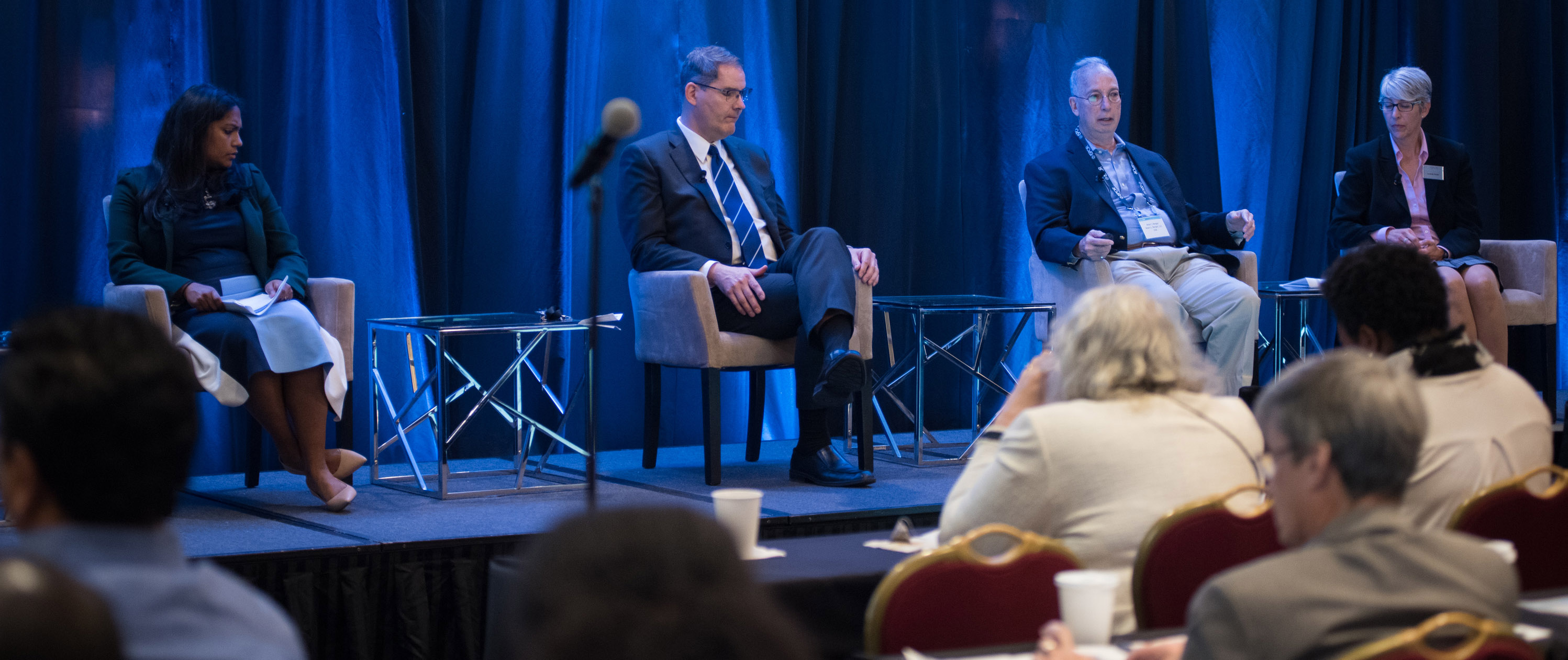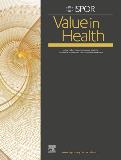
Real-world evidence on treatment outcomes can be an important aspect of the evidence basis for decision making if it is seen as credible. For real-world studies that are meant to test hypotheses about comparative-effectiveness or safety, a key aspect of credibility is that they are conducted transparently with tests that follow a prespecified analytic protocol. Preregistration of such study protocols on a public website would help build trust that their results can be used for decision-making purposes.
Establishing a Culture of Transparency for Real-World Evidence Studies...
The Real-World Evidence Transparency Initiative Partnership is a joint collaboration and ongoing effort between ISPOR, the International Society for Pharmacoepidemiology, the Duke-Margolis Center for Health Policy, and the National Pharmaceutical Council. The objective of this initiative is to establish a culture of transparency for study analysis and reporting of hypothesis evaluating real-world evidence studies on treatment effects.
Improving Transparency to Build Trust...
 The Real-World Evidence Transparency Initiative published a plan to encourage routine registration of noninterventional real-world evidence studies used to evaluate treatment effects. The report, “Improving Transparency to Build Trust in Real-World Secondary Data Studies for Hypothesis Testing—Why, What, and How: Recommendations and a Road Map from the Real-World Evidence Transparency Initiative,”
was published in the September 2020 issue of Value in Health.
The Real-World Evidence Transparency Initiative published a plan to encourage routine registration of noninterventional real-world evidence studies used to evaluate treatment effects. The report, “Improving Transparency to Build Trust in Real-World Secondary Data Studies for Hypothesis Testing—Why, What, and How: Recommendations and a Road Map from the Real-World Evidence Transparency Initiative,”
was published in the September 2020 issue of Value in Health.
More...
The report, “Improving Transparency to Build Trust in Real-World Secondary Data Studies for Hypothesis Testing—Why, What, and How: Recommendations and a Road Map from the Real-World Evidence Transparency Initiative,” was published in the September 2020 issue of Value in Health. The plan includes specifying the rationale for registering hypothesis-evaluating treatment effectiveness real-world evidence studies, the studies that should be registered, where and when these studies should be registered, how and when analytic deviations from protocols should be reported, how and when to publish results, and incentives to encourage registration.
Real-World Evidence Registry
The Real-World Evidence Registry provides researchers with a fit-for-purpose platform to register their study designs before they begin work to facilitate the transparency needed to elevate the trust in the study results.
More...
Real-world evidence studies can be used for hypothesis evaluation of treatment effects including safety (HETE studies). However these studies can also be perceived as less rigorous than clinical trials especially when not preregistered in a public setting such as ClinicalTrials.gov or the EU-PAS register.
ISPOR and its partners ISPE, NPC, and Duke Margolis have developed a simplified registration site especially for RWE HETE studies using secondary data. This searchable site provides a place for preregistration of studies that may not require registration for regulatory purposes but benefit from the rigor of transparent study methods and also provide a reference (such as a URL or doi) to share with peer reviewers, assessors, or other decision making bodies. Researchers can get started ‘here’ by creating a profile on the Open Sciences Framework and registering their study on the RWE Registry.
Shaking the Myth of Real-World Evidence
On-Demand Webinar
Learn more by watching the on-demand webinar, “Shaking the Myth of Real-World Evidence: Updates from the RWE Transparency Initiative.” This session provides updates from the initiative including a walk-through of the study registration site and updates on the special task force developing a standardized RWE protocol template.
Additional Resources
- Real-World Evidence Registry
 Good Practices Reports and Other ISPOR Reports from Value in Health
Good Practices Reports and Other ISPOR Reports from Value in Health
- HARmonized Protocol Template to Enhance Reproducibility of Hypothesis Evaluating Real-World Evidence Studies on Treatment Effects: A Good Practices Report of a Joint ISPE/ISPOR Task Force
- "Improving Transparency to Build Trust in Real-World Secondary Data Studies for Hypothesis Testing—Why, What, and How: Recommendations and a Road Map from the Real-World Evidence Transparency Initiative"
- "Good Practices for Real-World Data Studies of Treatment and/or Comparative Effectiveness"
- "Reporting to Improve Reproducibility and Facilitate Validity Assessment for Healthcare Database Studies V1.0"
- "Unlocking the Promise of Real-World Evidence" (Value & Outcomes Spotlight, Vol. 6, No. 5)
- ISPOR's Real-World Evidence Strategic Initiatives
Conferences & Summits

July 8, 2025
<p><a href="/education-training/webinars">Back to all webinars</a></p><h4>Open to all ISPOR Members and Non-members</h4><p><em><strong><br /></strong></em><strong>Title: </strong>Global Standards, Real-World Impact: The Role of HARPER </p><p><strong>Tuesday, July 8, 2025<br /></strong>10:00AM EDT | 2:00PM UTC | 4:00PM CEST<em></em><a href="https://www.timeanddate.com/worldclock/fixedtime.html?msg=ISPOR+Educational+Webinar%3A+Distributional+Cost-Effectiveness+Analysis+to+Inform+Healthcare+Decisions&iso=20220623T11&p1=12&ah=1" data-sf-ec-immutable=""></a></p><p><a href="https://www.timeanddate.com/worldclock/fixedtime.html?msg=Global+Standards%2C+Real-World+Impact%3A+The+Role+of+HARPER+&iso=20250708T10&p1=179&ah=1&am=15" data-sf-ec-immutable="">Click here for time zone conversion</a><br /><br /><a href="https://portal.ispor.org/eweb/DynamicPage.aspx?webcode=EventInfo&Reg_evt_key=f34555dd-1ac3-4261-bac7-9b2c12fc8eaa&RegPath=EventRegNoFees&FreeEvent=1&Event=ISPOR%20Webinar:%20Global%20Standards,%20Real-World%20Impact:%20The%20Role%20of%20HARPER&FundraisingEvent=0&evt_guest_limit=0" class="button primary" data-sf-ec-immutable="">Register Now</a></p><p><p=""><strong>Description</strong></p=""> </p><div><div><p paraid="107200562" paraeid="{0221935d-b249-4895-a372-c42ccc1328e0}{157}">The evolution of real-world evidence (RWE) studies is being shaped by an increasing focus on harmonized standards, transparency, and reproducibility. Historically, regulators, payers, and health technology bodies have faced RWE submissions of varying quality and detail. This has slowed review and approval process as well as limited the impact of RWE in decision making. Stakeholders on each side of the table seek predictable and transparent RWE study processes - from study planning and execution through review. HARPER is a harmonized protocol template designed to help investigators thoroughly consider and document conceptual and operational decisions as well as rationale for key study parameters that define the causal question (eg, target estimands). The common text, tabular, and visual structure facilitates reproducibility and helps multi-disciplinary teams know what to look for and where to find it. The template can enable efficient and effective assessment of validity and potential for biases from scientific reviewers that evaluate submitted protocols. </p></div><div><p paraid="1003549149" paraeid="{ffd04569-894b-4c68-889e-392cf470c1bf}{12}">Key global stakeholders have produced guidance that endorses or strongly encourages the use of HARPER for RWE study submissions designed to inform regulatory and reimbursement decisions including guidance from National Institute for Health and Care Excellence (NICE), Canada’s Drug Agency (CDA-AMC), Council for International Organizations of Medical Sciences (CIOMS), European Network of Centers for Pharmacoepidemiology and Pharmacovigilance (ENCePP), and others. This webinar focuses on the recent M14 guidance from the International Council of Harmonization (ICH) which sets international standards and promotes harmonization of global practices in study planning and execution of RWD studies submitted to international regulatory organizations and the Centers for Medicare and Medicaid Services’s (CMS) guidance on RWE to support national coverage determinations within the coverage with evidence development (CED) paradigm. </p></div></div><div><p paraid="314464852" paraeid="{4c2834d2-a80a-4788-8a3a-aadb901ebbc6}{19}"><strong>Learning Objectives</strong></p></div><div><p=""><p=""><ul><li>Understand the importance and relevance of the HARPER protocol template for RWE studies <br /></li><li>Identify the role of key global stakeholders in shaping harmonized study standards <br /></li><li>Examine the implications of the ICH M14 and CMS guidance on RWE studies <br /></li></ul></p=""> </p=""> </div><div><p><br /></p><p><strong>Moderator:</strong></p><p><strong>Laura Pizzi, PharmD, MPH, </strong>Chief Science Officer, ISPOR, Lawrenceville, NJ, USA</p><p><strong>Mary Beth Ritchey, MSPH, PhD, </strong>Med Tech Epi, LLC, Philadelphia, PA, USA</p><p><strong>Speakers:</strong></p><p><strong>Catherine Cohet, PhD, </strong>Pharmacoepidemiology/RWE Senior Specialists, European Medicines Agency, Amsterdam, Netherlands</p><p><strong>Steven Farmer, MD, PhD, </strong>Chief Strategy Officer, Centers for Medicare & Medicaid Services, Washington DC, USA</p><p><strong>Rachele Hendricks Sturrup, DHSc, MSc, MA, </strong>Research Director, Duke-Margolis Institute for Health Policy, Washington DC, USA<strong></strong></p><p><strong>Shirley Wang, PhD, ScM,</strong> Associate Professor, Harvard Medical School, Boston, MA, USA</p><p><strong></strong><strong></strong><strong></strong><strong></strong><br /></p><p><strong>Brought to you by: </strong> <a href="/member-groups/special-interest-groups/real-world-evidence-rwe">ISPOR Real-World Evidence Steering Committee</a></p></div><p paraid="271259179" paraeid="{8d771561-2af9-432a-af6d-681df4398e6a}{103}"><strong><br />Please note:</strong> On the day of the scheduled webinar, the <strong>first 1000 registered participants</strong> will be accepted into the webinar. For those who are unable to attend, or would like to review the webinar at a later date, the full-length webinar recording will be made available at the <a href="/education-training/webinars" rel="noopener noreferrer" target="_blank">ISPOR Educational Webinar Series webpage</a> approximately 2 days after the scheduled Webinar.</p><div>Reservations are on a first-come, first-served basis.</div>)
Short Courses & Webinars

July 8, 2025
<p><a href="/education-training/webinars">Back to all webinars</a></p><h4>Open to all ISPOR Members and Non-members</h4><p><em><strong><br /></strong></em><strong>Title: </strong>Global Standards, Real-World Impact: The Role of HARPER </p><p><strong>Tuesday, July 8, 2025<br /></strong>10:00AM EDT | 2:00PM UTC | 4:00PM CEST<em></em><a href="https://www.timeanddate.com/worldclock/fixedtime.html?msg=ISPOR+Educational+Webinar%3A+Distributional+Cost-Effectiveness+Analysis+to+Inform+Healthcare+Decisions&iso=20220623T11&p1=12&ah=1" data-sf-ec-immutable=""></a></p><p><a href="https://www.timeanddate.com/worldclock/fixedtime.html?msg=Global+Standards%2C+Real-World+Impact%3A+The+Role+of+HARPER+&iso=20250708T10&p1=179&ah=1&am=15" data-sf-ec-immutable="">Click here for time zone conversion</a><br /><br /><a href="https://portal.ispor.org/eweb/DynamicPage.aspx?webcode=EventInfo&Reg_evt_key=f34555dd-1ac3-4261-bac7-9b2c12fc8eaa&RegPath=EventRegNoFees&FreeEvent=1&Event=ISPOR%20Webinar:%20Global%20Standards,%20Real-World%20Impact:%20The%20Role%20of%20HARPER&FundraisingEvent=0&evt_guest_limit=0" class="button primary" data-sf-ec-immutable="">Register Now</a></p><p><p=""><strong>Description</strong></p=""> </p><div><div><p paraid="107200562" paraeid="{0221935d-b249-4895-a372-c42ccc1328e0}{157}">The evolution of real-world evidence (RWE) studies is being shaped by an increasing focus on harmonized standards, transparency, and reproducibility. Historically, regulators, payers, and health technology bodies have faced RWE submissions of varying quality and detail. This has slowed review and approval process as well as limited the impact of RWE in decision making. Stakeholders on each side of the table seek predictable and transparent RWE study processes - from study planning and execution through review. HARPER is a harmonized protocol template designed to help investigators thoroughly consider and document conceptual and operational decisions as well as rationale for key study parameters that define the causal question (eg, target estimands). The common text, tabular, and visual structure facilitates reproducibility and helps multi-disciplinary teams know what to look for and where to find it. The template can enable efficient and effective assessment of validity and potential for biases from scientific reviewers that evaluate submitted protocols. </p></div><div><p paraid="1003549149" paraeid="{ffd04569-894b-4c68-889e-392cf470c1bf}{12}">Key global stakeholders have produced guidance that endorses or strongly encourages the use of HARPER for RWE study submissions designed to inform regulatory and reimbursement decisions including guidance from National Institute for Health and Care Excellence (NICE), Canada’s Drug Agency (CDA-AMC), Council for International Organizations of Medical Sciences (CIOMS), European Network of Centers for Pharmacoepidemiology and Pharmacovigilance (ENCePP), and others. This webinar focuses on the recent M14 guidance from the International Council of Harmonization (ICH) which sets international standards and promotes harmonization of global practices in study planning and execution of RWD studies submitted to international regulatory organizations and the Centers for Medicare and Medicaid Services’s (CMS) guidance on RWE to support national coverage determinations within the coverage with evidence development (CED) paradigm. </p></div></div><div><p paraid="314464852" paraeid="{4c2834d2-a80a-4788-8a3a-aadb901ebbc6}{19}"><strong>Learning Objectives</strong></p></div><div><p=""><p=""><ul><li>Understand the importance and relevance of the HARPER protocol template for RWE studies <br /></li><li>Identify the role of key global stakeholders in shaping harmonized study standards <br /></li><li>Examine the implications of the ICH M14 and CMS guidance on RWE studies <br /></li></ul></p=""> </p=""> </div><div><p><br /></p><p><strong>Moderator:</strong></p><p><strong>Laura Pizzi, PharmD, MPH, </strong>Chief Science Officer, ISPOR, Lawrenceville, NJ, USA</p><p><strong>Mary Beth Ritchey, MSPH, PhD, </strong>Med Tech Epi, LLC, Philadelphia, PA, USA</p><p><strong>Speakers:</strong></p><p><strong>Catherine Cohet, PhD, </strong>Pharmacoepidemiology/RWE Senior Specialists, European Medicines Agency, Amsterdam, Netherlands</p><p><strong>Steven Farmer, MD, PhD, </strong>Chief Strategy Officer, Centers for Medicare & Medicaid Services, Washington DC, USA</p><p><strong>Rachele Hendricks Sturrup, DHSc, MSc, MA, </strong>Research Director, Duke-Margolis Institute for Health Policy, Washington DC, USA<strong></strong></p><p><strong>Shirley Wang, PhD, ScM,</strong> Associate Professor, Harvard Medical School, Boston, MA, USA</p><p><strong></strong><strong></strong><strong></strong><strong></strong><br /></p><p><strong>Brought to you by: </strong> <a href="/member-groups/special-interest-groups/real-world-evidence-rwe">ISPOR Real-World Evidence Steering Committee</a></p></div><p paraid="271259179" paraeid="{8d771561-2af9-432a-af6d-681df4398e6a}{103}"><strong><br />Please note:</strong> On the day of the scheduled webinar, the <strong>first 1000 registered participants</strong> will be accepted into the webinar. For those who are unable to attend, or would like to review the webinar at a later date, the full-length webinar recording will be made available at the <a href="/education-training/webinars" rel="noopener noreferrer" target="_blank">ISPOR Educational Webinar Series webpage</a> approximately 2 days after the scheduled Webinar.</p><div>Reservations are on a first-come, first-served basis.</div>)




